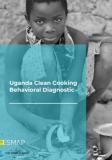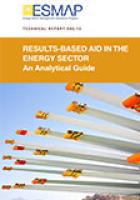Publications
This report considers whether and how to use results-based aid (RBA) to support development objectives in the energy sector. It was commissioned by the Energy Sector Management Assistance Program (ESMAP) as part of a broader initiative looking at the potential for greater use of results-based funding for energy sector development.
The objective of the report is to explain the circumstances in which RBA may best be used, as well as to provide practical suggestions to recipients, funders, and development practitioners on how to design an RBA agreement so as to increase the likelihood of success. Although its primary focus is on the energy sector, and this sector provides the bulk of the contextual examples used in the report, much of the analysis is also relevant to other sectors.
In its purest form, three features define an RBA approach. These are:
-
An agreement between a funder and a national or regional government about payments for pre-defined results (not inputs);
-
An agreement only about a set of results, with few or no stipulations about inputs or methodology, which gives the recipient freedom in how to deliver the results; and
-
The verification of results by an independent third party, with payments disbursed as soon as possible after results are verified.
Vivid Economics; Savedoff, William. 2015. Results-Based Aid in the Energy Sector: An Analytical Guide. Energy Sector Management Assistance Program (ESMAP);Technical Report 005/15. World Bank Group, Washington, DC. © World Bank. License: CC BY 3.0 IGO. https://openknowledge.worldbank.org/handle/10986/21622


